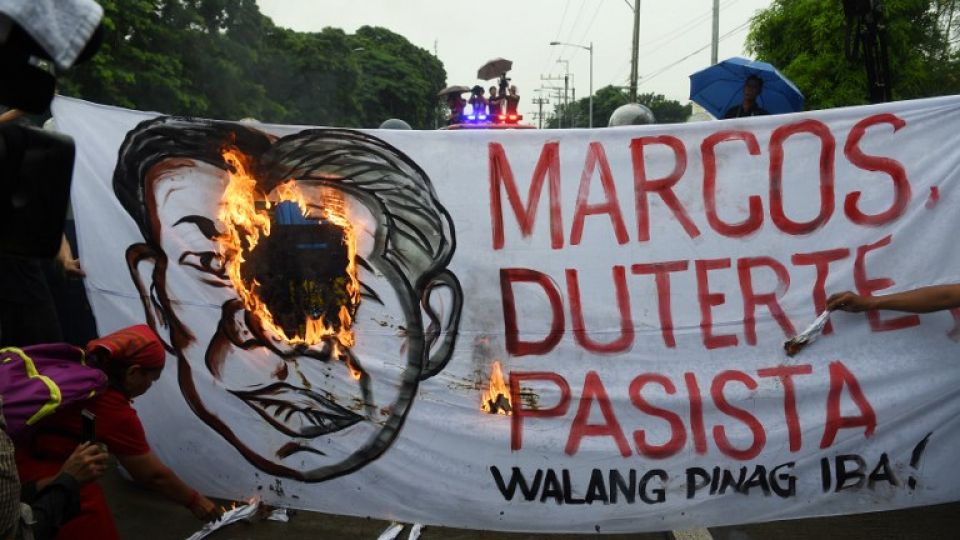October 17, 2018
Marcos family seeks to strengthen political clout.
The eldest daughter of the former Philippine dictator Ferdinand Marcos on Tuesday (Oct 16) began her bid to secure a Senate seat to solidify her family’s political comeback since the Marcoses fled in disgrace following a popular revolt more than 30 years ago.
“Our country is ready to hear other thoughts and our side of the story… I believe there has been a shift in how the past is interpreted,” Ms Imee Marcos, 62, told reporters after filing her certificate of candidacy to run in the Senate election next year.
“I think the new generation, particularly the millennial generation, is ready to hear our side of the story,” said Ms Marcos.
The mother of three sons is in her final term as governor of Ilocos Norte province in northern Philippines after being first elected to the post in 2010.
On Tuesday, supporters of Mr Chel Diokno, a human rights lawyer who is also running for senator, jeered at Ms Marcos as she made her way to the office of the election commission, shouting: “Marcos, Hitler, dictator, lapdog!”
Mr Diokno is the son of former senator Jose Diokno, a human rights advocate who was jailed by Mr Ferdinand Marcos shortly after martial law was declared in 1972.
But polls show that Ms Marcos will likely win the election.
Her likely win underlines how the Marcos family has enjoyed a revival after they fled the Philippines in 1986 in the face of a “people power” uprising . This was triggered by public anger over abuses under Mr Marcos, especially the assassination of his political rival, former senator Benigno Aquino Jr.
Thousands of people were killed and tortured during the Marcos era, and the Marcos family was accused of stealing roughly US$10 billion (S$13 billion) in government treasure to enrich itself.
Mr Marcos died in exile in Hawaii in 1989, but his wife, Imelda, and children were subsequently allowed to return home.
With a new generation of voters born after the 1986 uprising gaining influence at the polls, the family has seen an upturn in their political fortunes.
Mrs Marcos, 89, is a Congressman and is now running for governor of Ilocos Norte province, the family’s bailiwick in northern Philippines. Her running mate will be her grandson Matthew Marcos Manotoc, 28, a member of the Ilocos Norte provincial government.
One reason for the revival of the Marcos family is that they have capitalised on voters unhappy with how the Philippines has been run in recent decades.
Much of the anger fuelling the Marcoses’ rise has been directed at Mr Aquino’s family.
Shortly after the 1986 revolt, Mr Aquino’s widow, Corazon, became the president and guided the country out of deep divisions as it adjusted to democracy.
Their son, Mr Benigno Aquino III, later became the president from 2010 to 2016.
While democratic institutions have been reinstated and the Philippines has enjoyed some measure of prosperity in the last 30 years or so, many voters, especially the younger ones, feel that growth has benefited only the political and economic elite and has not trickled down to the broader population.
They blame the Aquinos and their backers, even though the Philippines has seen a succession of presidents from rival political parties, including former actor Joseph Estrada, who is an ally of the Marcos family.
In a measure of how the tide has turned against the Aquinos, Senator Paolo Benigno Aquino IV, nephew of Mr Aquino III, has been faring poorly in surveys, as he seeks re-election to the Senate.
The Marcos family has also benefited from the rise of President Rodrigo Duterte, a self-professed fan of Mr Marcos and his strongman ways.
In 2016, he granted Ms Marcos’ longstanding wish for her father to be buried with military honours at a Manila heroes’ cemetery.
He has also said that if he steps down, Mr Marcos Jr would be a capable replacement for him than his current vice-president, Ms Leni Robredo.
Ms Marcos has also forged a close political alliance with Mr Duterte’s daughter, Davao City Mayor Sara Duterte.
But ill feelings towards the Marcoses continue to run deep among many Filipinos.
Ms Marcos recently drew angry rebukes after she advised Filipinos to move on and forget about the past.
“The millennials have moved on, and I think people at my age should also move on as well,” Ms Marcos said, as quoted by local newspapers.


